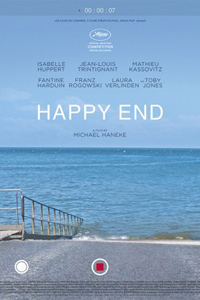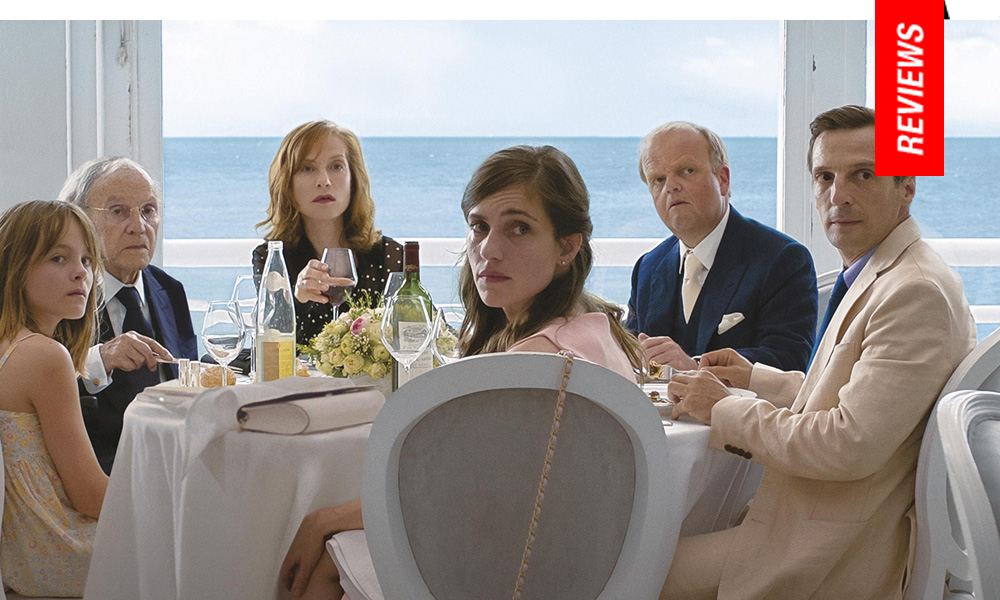Happy End | 2017 Cannes Film Festival Review
The Sunshine of Their Love: Haneke Dishes Up Black Comedy with a Dollop of Self-Loathing
 Happy families are all the same in a Michael Haneke film…because none of them are ever actually happy. Thus, the automatic irony with which to approach the septuagenarian Austrian auteur’s latest slice of austere miserabilism, Happy End, is obvious before the opening credits even roll. Incorporating more contemporary modes of social media into his visual palette than many a Hollywood studio production, Haneke’s icy focus settles into a jaggedly cynical groove of a crumbling family of privileged elitists in Calais, a famed port city in Northern France. As each family member suffers through their own private emotional dilemmas, some violent, and aggressive behaviors further enhance the actual ties that bind in their bloodline.
Happy families are all the same in a Michael Haneke film…because none of them are ever actually happy. Thus, the automatic irony with which to approach the septuagenarian Austrian auteur’s latest slice of austere miserabilism, Happy End, is obvious before the opening credits even roll. Incorporating more contemporary modes of social media into his visual palette than many a Hollywood studio production, Haneke’s icy focus settles into a jaggedly cynical groove of a crumbling family of privileged elitists in Calais, a famed port city in Northern France. As each family member suffers through their own private emotional dilemmas, some violent, and aggressive behaviors further enhance the actual ties that bind in their bloodline.
The Calais based Laurent family is set to implode thanks to a myriad of dramatic coincidences which unravel their tenuous financial and personal stabilities. Anne (Huppert), is a single mother who runs her family’s business, which is met with travesty when a wall collapses on a construction site, accidentally killing an employee. The incident calls into question her son Pierrot’s (Franz Rogowski) leadership skills as foreman, and delays some significant business dealings Anne has brewing with lawyer Lawrence (Toby Jones), a man to whom she will eventually become betrothed. Meanwhile, her brother Thomas (Mathieu Kassovitz), a successful doctor who just fathered his second child with second wife Anais (Laura Verlinden), is forced to deposit his oldest daughter Eve (Fantine Harduin) on Anne’s estate when his ex-wife overdoses on pills and ends up in the hospital. Adding to all the fun, Anne’s increasingly forgetful father Georges (Jean-Louis Trintignant) sneaks off with a car and injures himself in the middle of the night, while no one is quite sure if the act was accidental.
Notably, Happy End marks Haneke’s fourth union with Isabelle Huppert, which famously began with 2001’s The Piano Teacher, one of the indomitable performer’s signature roles. He allows Huppert to be unleashed once again as an icy matriarch whose main concerns are some underhanded maneuverings with the family business she now runs singlehandedly. An unfortunate workplace accident, shown by the company’s security footage, seems to be the turning point for Anne to make a decision on firing her troublesome son as a manager, which leads to a spiraling meltdown of alcohol, violence, and an incredibly animated karaoke performance of Sia.
Her brother, played by director Mathieu Kassovitz is also an absent parental figure, reigned into unloading preadolescent daughter Eve on Anne’s household when the girl’s mum dies from a questionable overdose. Eventually, Eve makes for a strange, intergenerational bedfellow with Jean-Louis Trintignant’s suicidal, semi-amnesiac grandfather who sees all the tell-tale signs of a bad seed in his traumatized grandchild. If Huppert may ultimately earn demure praise thanks to Anne Laurent’s similarities to several other model examples from her filmography, she still manages to impress, particularly in Happy End’s wedding party (an amusing union with Toby Jones), which allows Huppert to add at least one extraordinary new memento to her scrapbook of villainy.
Along with several key elements revealed throughout, the return of Jean-Louis Trintignant and Huppert playing father and daughter once again makes Happy End seem like the shady sister sequel to 2012’s Palme d’Or winning Amour. But, as many will also note, Haneke is up to his usual typifying tricks—Anne Laurent was the name of the character played by Juliette Binoche in both Code Unknown (2000) and Cache (2005), and Georges Laurent was Daniel Auteuil (and in Amour Georges was Trintignant, and Anne was Emmanuelle Riva). Trintignant and Huppert are here repositioned as father-daughter George and Anne, but their cinematic history goes back even further, as the actors also played husband and wife in Michel Devill’s 1981 Patricia Highsmith adaptation, Deep Water, which only adds to the sordidly incestuous extra textual subtexts floating around.
Haneke’s usual DP Christian Berger displays the expected level of complex, puzzle piece styled frames which linger and hinder as we try to put everything together. A long tracking shot featuring Trintignant in a wheelchair as he has an inaudible conversation with a group of Africans is reminiscent of similar sequences in 2005’s Cache, the meaning of which is only later made eerily evident. Opening with menacing Instagram Live footage, also which is the set-up for a considerable wallop, Happy End is a series of false starts and foreboding sequences which eventually begin to deliver the goods in this snake pit set soap opera.
Ever since the film went into production, the film was described as a narrative about the ongoing refugee crisis providing the background for a snapshot of a bourgeois European family blind to the world around them. As it turns out, the refugees are even more peripheral, almost invisible (including the Moroccan household staff members) to the film’s narrative, which suggests Happy End is pointing a wagging finger at the entirety of white, privileged Europe, a continent engaged in her own foolhardy, manipulative dramas, happily ambivalent to anything beyond the safety and convenience of self-imposed blinders.
While Happy End will most likely be eclipsed by Haneke’s own formidable shadow in the eventual endless comparisons of what has come before, this is still wickedly superb social satire, and the little bit of sugar evident in his latest formulation only allows the lacerations to cut deeper.
Reviewed on May 20 at the 2017 Cannes Film Festival – Main Competition. 107 Mins
★★★★/☆☆☆☆☆
Los Angeles based Nicholas Bell is IONCINEMA.com's Chief Film Critic and covers film festivals such as Sundance, Berlin, Cannes and TIFF. He is part of the critic groups on Rotten Tomatoes, The Los Angeles Film Critics Association (LAFCA), the Online Film Critics Society (OFCS) and GALECA. His top 3 for 2021: France (Bruno Dumont), Passing (Rebecca Hall) and Nightmare Alley (Guillermo Del Toro). He was a jury member at the 2019 Cleveland International Film Festival.

























